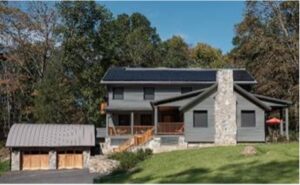FIRST LEED PLATINUM PASSIVE HOUSE IN WESTCHESTER


Daniel Colombini, a principal at Goldman Copeland, the New York City-based consulting engineering firm, has created the first LEED Platinum “Passive House” in Westchester County, which abuts New York City on the north. The single-family three-bedroom house with an attached garage and about 3,500 square feet of living space is located in Ossining. It offers a new model for sustainable, energy-efficient and cost-effective residences.
A Passive House is a high-performance building standard developed by the Passive House Institute and is the only internationally recognized, performance-based energy standard in construction. LEED is the world’s most widely used green building rating system, and LEED Platinum is its highest certification. The combination of LEED Platinum and Passive House certifications shows that the house meets the highest levels of energy-efficient and green design. The house is also Zero Energy – as certified by the U.S. Department of Energy – and is both net zero and carbon neutral, including the home’s energy consumption and electric vehicle charging.
Colombini, the engineer-homeowner, set out to create a new standard of suburban housing. The home is a partial tear-down and retrofit, meaning that the house that he originally purchased was torn down except for the foundation, which was retained and 75% of the materials in the old house was reused and thereby diverted from landfill. The new house incorporates passive house principles, including a high-performance thermal enclosure, airtightness and heat recovery, continuous balanced ventilation, high-performance glazing of windows and doors, shading and daylighting and moisture control. The overall design provides an air quality that it is so high that Colombini’s allergy-induced asthma disappeared.
The cost of construction was 8% higher than a traditional house. That additional cost will be paid off by energy savings within 10-15 years – with energy savings continuing to accrue thereafter.
The architect for the project is Christina Griffin of CGA Studio in Hastings-on-Hudson, New York. The contractor is Ed Nugent of Fort Montgomery, New York; the certification consultant is Integral Building + Design in New Paltz, New York; and the landscape designer is Barbara Restaino of Restaino Design in Grahamsville, New York.
The house is located adjacent to the Teatown Nature Preserve, and all new planting and landscaping consists of native species, designed to improve storm water management and mitigate invasive species. The landscape designer was selected in part because she also works with Teatown, ensuring sensitivity in design to the landscape of the nature preserve.
“Energy-efficient and green design is vital, given the challenges of climate change,” said Colombini. “This house provides the home that my family wanted, while demonstrating that the highest standards can be attained cost-effectively. I hope that it provides an example that can benefit Westchester, New York, and the nation.”
Goldman Copeland, the New York City-based consulting engineering firm, is active within the broader tri-state real estate community addressing the engineering needs of commercial office buildings, health-care facilities, universities, cultural institutions, religious and civic institutions and government facilities. The firm has completed energy audits and retro-commissioning projects for more than 70 million square feet of commercial and institutional properties. Among the world-renowned properties for which it has provided engineering services are Grand Central Terminal, the Empire State Building, Carnegie Hall and Broadway and Off-Broadway theaters.